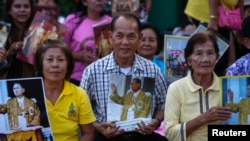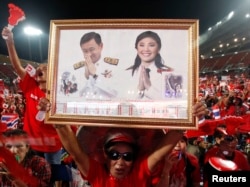BANGKOK —
Thailand is facing escalating political tensions as tens of thousands of anti-government protesters have turned out in Bangkok, pressing the government to resign.
Anti-government street rallies escalated Monday as protestors marched to key government buildings, briefly occupying the finance ministry and targeting state enterprises, police and army and the ministry of interior.
There were no initial reports of violence or trouble as protestors handed flowers to state officials amid calls by rally leaders to enter buildings peacefully.
Monday's rallies followed a major gathering Sunday where an estimated 100,000 people turned out to call for Prime Minister Yingluck Shinawatra's government to resign.
Protestors are also calling for an end to what critics see as the excessive influence of her brother, former leader Thaksin Shinawatra, who remains overseas to avoid a two year jail term for corruption.
Thitinan Pongsudhirak, a political scientist at Chulalongkorn University, said the outlook for the government is highly uncertain. "It's going to be a tumultuous week, very precarious. Something will have to give. The government now has to respond," said Pongsudhirak. "The protestors are demanding the entire overhaul, uprooting of everything associated with Thaksin Shinawatra, which is an open ended, very difficult demand to meet."
The latest round of protests started earlier this month when the government attempted to pass a blanket amnesty bill for everyone involved in Thailand's political conflicts of recent years. Thailand's Senate voted down the measure which many believed would have allowed Mr. Thaksin to return to Thailand a free man.
The government faced another setback last week when the Constitutional Court ruled against a bill to provide for a fully elected upper house of parliament. The Senate at present consists of half elected members and the remainder appointed. Critics claimed the bill would allow for relatives of existing parliamentary members to be elected to the upper house, undermining its independence.
Panitan Wattanayagorn, a former government spokesman and political scientist, said the government is now seen to be 'struggling' in the face of the rising political tensions. "The government is struggling to find an appropriate response. If this situation continues too long the legitimacy of the government could be destroyed because never before do you have people who are coming out on the streets like this and demanding the system to be more responsive to the needs of the people," he stated.
While pressure builds against the government, its supporters, known as Red Shirts, under the leadership of the United Front of Democracy against Dictatorship, are massing at a stadium on the outskirts of Bangkok.
UDD chairwoman, Tida Tawornseth, said the government remains confident of riding out the latest political storm. "[The government] thinks that they keep everything in the normal situation. But we don't want to put other pressure so we try to have our people on the stadium. But we will try to get more and more people," Tawornseth said. "They said that they can control, but anyway we don't want to see any violence. We don't want the government to make the situation that maybe [leads] to a military coup."
The Yingluck administration's first two years in office marked a period of stability for Thailand's occasionally raucous politics. But with mounting street protests and legal challenges, including corruption charges against the Prime Minister and senior cabinet ministers, there are signs that the country's politics are entering a new, more volatile phase.
Anti-government street rallies escalated Monday as protestors marched to key government buildings, briefly occupying the finance ministry and targeting state enterprises, police and army and the ministry of interior.
There were no initial reports of violence or trouble as protestors handed flowers to state officials amid calls by rally leaders to enter buildings peacefully.
Monday's rallies followed a major gathering Sunday where an estimated 100,000 people turned out to call for Prime Minister Yingluck Shinawatra's government to resign.
Protestors are also calling for an end to what critics see as the excessive influence of her brother, former leader Thaksin Shinawatra, who remains overseas to avoid a two year jail term for corruption.
Thitinan Pongsudhirak, a political scientist at Chulalongkorn University, said the outlook for the government is highly uncertain. "It's going to be a tumultuous week, very precarious. Something will have to give. The government now has to respond," said Pongsudhirak. "The protestors are demanding the entire overhaul, uprooting of everything associated with Thaksin Shinawatra, which is an open ended, very difficult demand to meet."
The latest round of protests started earlier this month when the government attempted to pass a blanket amnesty bill for everyone involved in Thailand's political conflicts of recent years. Thailand's Senate voted down the measure which many believed would have allowed Mr. Thaksin to return to Thailand a free man.
The government faced another setback last week when the Constitutional Court ruled against a bill to provide for a fully elected upper house of parliament. The Senate at present consists of half elected members and the remainder appointed. Critics claimed the bill would allow for relatives of existing parliamentary members to be elected to the upper house, undermining its independence.
Panitan Wattanayagorn, a former government spokesman and political scientist, said the government is now seen to be 'struggling' in the face of the rising political tensions. "The government is struggling to find an appropriate response. If this situation continues too long the legitimacy of the government could be destroyed because never before do you have people who are coming out on the streets like this and demanding the system to be more responsive to the needs of the people," he stated.
While pressure builds against the government, its supporters, known as Red Shirts, under the leadership of the United Front of Democracy against Dictatorship, are massing at a stadium on the outskirts of Bangkok.
UDD chairwoman, Tida Tawornseth, said the government remains confident of riding out the latest political storm. "[The government] thinks that they keep everything in the normal situation. But we don't want to put other pressure so we try to have our people on the stadium. But we will try to get more and more people," Tawornseth said. "They said that they can control, but anyway we don't want to see any violence. We don't want the government to make the situation that maybe [leads] to a military coup."
The Yingluck administration's first two years in office marked a period of stability for Thailand's occasionally raucous politics. But with mounting street protests and legal challenges, including corruption charges against the Prime Minister and senior cabinet ministers, there are signs that the country's politics are entering a new, more volatile phase.









